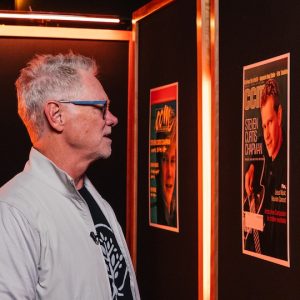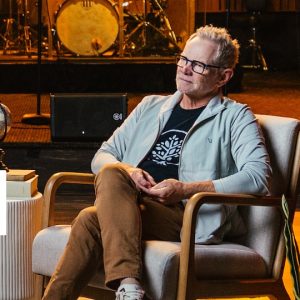
Steven Curtis Chapman: “Speechless’ Finds its Voice at 25 – Cover Story
The label G.O.A.T. (Greatest of All Time) gets thrown around a lot these days, usually pinned to whoever’s trending or collecting the most streams that week. But legends of the moment aren’t the same as Hall of Famers. Enter Steven Curtis Chapman. He walks humbly into our studio for the first time since Amanda and I took over the reins of a magazine he’s practically synonymous with. There’s no weirdness, no distance. He’s happy to be here and ready to talk about the upcoming celebration of the 1999 landmark record Speechless.

Steven arrived straight from rehearsals across town for the anniversary tour, and he lit up as he walked us through the new lineup. Joining him onstage will be Garrett Tyler and Danny Lopez from for KING + COUNTRY, original Speechless guitarist Randy Pearce, longtime bassist Brent Milligan, and a brand-new addition of a string section, ready to help bring the entire album to life, front to back.
Anniversary tours are everywhere these days, but let’s be honest, how many artists decide to tour their tenth release 25 years later? To really appreciate it, you’ve got to rewind even further. Speechless came out over a decade after Steven’s breakout success. By then, most artists are deep into the second act of their career, and second acts rarely hit with the same force as the first. But somehow, this one brought in an entire new generation.

“I’m at that point,” he said. “The musicians I love, they’re doing anniversary tours.”
He brought up Huey Lewis and the News, specifically the Sports album — a record that dominated the ’80s with hit after hit and shaped an entire era of pop rock.
“I got to see Huey Lewis do Sports from start to finish, and sadly… he’s had to stop touring,” Steven told me, referring to Lewis’ battle with Ménière’s disease, which has left him nearly deaf. “I got to see that tour. And it was one of my favorite musical moments because that record influenced me and inspired me in so many ways.”
The Speechless celebration carries that same weight. It’s an if not now, then when? kind of moment. Because as much as we wish otherwise, we know our favorite artists won’t be able to perform at their peak forever.
“Thankfully, we’re still good,” he said, smiling, referring to that still-endearing voice and performance level. “Now, we might drop the key of a few of those songs because they were too high when I recorded them, even. We get in the studio, we get jacked up on adrenaline. It’s like, no, let’s go a key higher. And then you got to sing it five [nights] in a row when you go, ‘What was I thinking?!’”
By the end of the 1990s, Chapman had earned the right to rest on his laurels. He was over ten years in, dozens of number ones, sold-out tours built around greatest hits sets, and an unintentional three-year silence when it came to new studio material.
“I had done the Signs of Life record, and that was a real shift musically” Steven told me. “I leaned really heavily into some of my love for blues.” Critics called it swamp gospel. Some fans weren’t sure what to make of it. “And then there’s always that, what’s the next thing? What’s the next, you know, music going to be? What’s the next record?”
Fast forward to June 3, 1999. You’re in the parking lot of a Family Christian Bookstore, you’re painstakingly trying to open a brand new CD. A multi-step process completely lost to time and the current generation. Finally, after using your car keys and teeth, you pop Speechless into the multi-disc changer. Track one kicks off with a drum fill and some ethereal sounds swirling in. This is far from The Lord of the Dance. This is turn-of-the-millennium radio pop and I say that with love and affection.
That track? Dive. The song millennials most associate with Steven Curtis Chapman. It’s a high-octane pop anthem that practically launches itself out of the speakers. Dive has had one of the longest shelf lives of any song in contemporary Christian music, and it all came from Steven’s hunger to stay curious.

Still Photographer: Alicia St Gelais
“I think that was part of what was really special about this record and this music,” Steven said. “One of the things that was important for me through the years was just staying a student of current music. Music is a language.” He leaned into that idea. “I feel like there’s a certain dialect of what people are speaking at the time, particularly with pop music… that’s most culturally relevant to the times” But Steven didn’t want to abandon his roots. “What I always love to try to do is ask “how do I stay true to me?” I’m a boy from Kentucky and there’s always a guitar somewhere close by. If you listen to pretty much all of my music, you’re going to hear an acoustic guitar in there somewhere in that track.”
The song that influenced Dive is far from a deep track and I want to give you fair warning. Once you know the inspiration, there is no going back. “For those of us who remember Chumbawamba.” A word I could not have anticipated hearing during this interview. For those that don’t recall, Chumbawamaba was a British anarchist rock band who just so happened to end up as one of the biggest one-hit-wonders of the 90s.
Steven reminds us of the chorus of their 1997 hit Tubthumping: “ ‘I get knocked down, but I get up again, you’re never gonna keep me down.’ You couldn’t help but start bobbing your head. You could see everybody was jumping up and down. And I thought, that’s interesting. That’s communicating something to a lot of people, especially kids. That was kind of sweeping the world.”
The spark was there.
“I had a guy playing bass for me at the time named Adam Anders, who was like 19 years old when he came to play for me.”
Adam would go on to become one of the biggest names in pop production, working with the Backstreet Boys, Jonas Brothers, Miley Cyrus, Selena Gomez, and eventually taking over network TV as the executive music producer for Glee. But back then, he was just a kid with boundless energy and zero fear.
“Adam was 19 years old and was just in that phase of ‘there were no rules’ with what you could do with music. And so he got a bunch of synthesizers and keyboards and guitar pedals and all kinds of stuff. And just started and I said, here’s a song … I played him Dive on the guitar… and I said, go make it cool.”

It was a lot of trust to place in a 19-year-old, but what Adam delivered earned full support from producer Brown Bannister. With both Brown and Steven on board, Speechless had found its breakout single and the label got behind the new direction.
That’s not to say Dive was the only single, 7 tracks went to #1 and the album went platinum. For all the energy packed into Dive, the real heartbeat of Speechless was something quieter, deeper and marked Chapman’s return to awe.
“I remember talking with my pastor, Scotty Smith, who has walked through so many seasons of, music and ministry. And we were having another one of those conversations and, and we’re just talking about my life, my career, my family, so much was going on and how do I really stay fresh in just being amazed at the grace of God.”
It wasn’t just a songwriting problem. It was a soul issue.
“I’ve been singing Amazing Grace my whole life, but how do I keep hold of how amazing it is?”
Then Scotty said something that stuck. “I remember him saying this phrase — gospel astonishment. He’s like, ‘that’s the thing for me.’ He said, in my whole journey, it’s how do I stay freshly astonished at how good the gospel is? That God loved us enough that He put on Jesus what we deserved and gave us what we could never deserve and earn it. Just the message of the gospel. And he called it gospel astonishment.”
Steven paused, then added: “And I was like, man, I think that is the theme of my life right now. And I want to, you know, I want to keep writing songs about that.”
Three days later, he found himself sitting with a few close friends, the kind of crew that didn’t need an agenda. They’d meet once a week to pray, talk, and check in on each other. Slowly, the next chapter started to take shape.
“I’ve been singing Amazing Grace my whole life, but how do I keep hold of how amazing it is?”
Out of those weekly hangouts where Steven admits to sometimes driving his friends and family crazy with all his questions and theories came the word that would define the album. But first, Steven had to take a loving hit to the ego.
“And I remember one of my buddies said, ‘Man, you know, Chapman, do you ever just sometimes stop talking and just be quiet? Just be still and listen, you know, to what God is saying?’”
He laughed telling me that part. It was a well-earned jab that only a friend could deliver.
I said, ‘You mean like Steven Curtis Chapman… be speechless?’ And that was it. Everything he and Scotty Smith had been talking about. It suddenly clicked into one word. Not everyone bought it right away.
“My wife laughed when I told her I was writing a song called Speechless, because she’s known me to be anything but speechless.” What came from moments that felt like wrestling with God’s wonder and purpose came song after song. A deliberate arc that plays out track by track. Steven’s sons saw it too.

“My boys Caleb and Will Franklin have their band Colony House and we talk a lot about this.” Steven said. “Caleb is like, ‘Dad, that’s the kind of music I grew up watching you make. Records. Albums that were a whole arc. It’s like a book. You don’t just go to chapter 14.’”
Sure, some tracks can stand alone, but they land harder when you hear the whole journey. “I got to be a part of that era of music. Albums like Speechless might not have ever been made in a day and time like this. Because there was an idea of how it starts and where it flows and where it goes. Every song doesn’t have to be a three-minute single.”
As I listened back through the album the night before our interview, I was taken a back by a song that I probably skipped as a teenager. With Hope. Now, as a dad with kids in school, the lyrics carried a new weight. And the story behind it felt chillingly current. It’s not a relic of the past. It’s not old news. The tragedy that inspired it is still playing out in the headlines more than 25 years later.
“One of the first school shootings happened in Paducah, in my high school where I went to high school and graduated. Heath High School,” Steven told me. “And my dad, who has his music store still at 87, still teaches guitar lessons in Paducah. All of the students who were killed in that shooting were students of his.”
You could feel the shift in his voice as he relived it.
“I was asked to come be a part of the funeral services. And then we actually did a big tribute concert at Heath High School during that time. So that was obviously very, very impactful for me.”
The song could have been crafted from that tragedy, but sadly another event would hit even closer to home. Steven and his wife were with close friends from their church small group watching a football game. The group eventually split up and went home. Steven and Mary Beth had just gotten settled when the phone rang not even an hour later. A mom and two daughters from their group had been in a serious car accident. They were being rushed to Vanderbilt Hospital. No one knew yet if they would survive.
“I got in my car, headed down to Vanderbilt, and their oldest daughter, Erin Mullican, did not survive the crash. Thankfully, Mom and the other daughter did. We were with them for days and weeks of calm and just praying them through the recovery. The Mullican family, Ray and Lori Mullican, just became very, very dear to us through that time.”
And then, With Hope.
“I forgot about this until I was listening through [Speechless] and talking about how do we do the segues. We’re just listening through the whole record, and I get to that song and hear Erin.” The beautiful and haunting opening to With Hope is a young Erin Mullican singing Jesus Loves Me.“I’m just undone. Because I haven’t listened to that [in years].”
Erin Mullican’s death had already left a permanent mark on the Chapmans’ hearts. The families had grieved side by side, walked through recovery together, and stayed close.
So when Steven and Mary Beth faced their own unthinkable loss , the death of their youngest daughter, Maria, it was Lori Mullican who was there for them. She drove them to the hospital in their darkest hour. The layers of connection were hard to comprehend and impossible to ignore. “To have someone that you journeyed with through that, and what that song meant… and then to have them there to walk through your darkest moment, it was one of those, it’s so strange to call anything a gift in a moment like that, but that was a gift of God’s provision for us and our family.”
He paused, then added, “Just to have a family that survived that devastation, and to have them… to walk alongside us.”
I asked if he’d played the song much in recent years during his live shows.
He shook his head.
“The last time that I really remember hearing and listening to With Hope was actually at Maria’s memorial service. Geoff Moore, my best friend, sang the song With Hope, at Maria’s memorial.”

For a moment, the room had shifted. You could feel the weight of With Hope still lingering. But Steven, as he’s done so many times before, gently brought us back. Not by ignoring the sorrow, but reminding us that Speechless isn’t an album about grief. Many of the songs on the record, he reminded me, were inspired by fatherhood. Some directly, others in spirit. And suddenly, we weren’t in the valley anymore. We were back in it.
“Fingerprints of God. I wrote for Emily, when she was, 12 years old. That song was written for her because she looked at herself in the mirror and looked ugly and thought she was fat and didn’t look like the girls in the magazine picture. That song — now I’m singing that song and Emily is 39 years old and she is a mother of three of the most beautiful, amazing young ladies.”
That little girl in the mirror has grown into one of the driving forces behind Show Hope, the adoption nonprofit the Chapmans launched. “She and her mom… they’re the heart and soul of the work of Show Hope. They’ve helped almost 10,000 families.” He paused, then smiled.
“I mean, when I sing, ‘I see the Fingerprints of God on you’… I saw it then. But now I’m singing, looking back, going, look at what God has used your life to do. She’s meeting with me last night. ‘Yeah, I’m meeting with the first lady… and this contingent of people pushing forward the adoption advocacy in our nation’s capital.’And I go back and sing, ‘I can see the fingerprints of God when I look at you,’ I’m like, see? Told you!”
Be Still and Know came up too, the finale of Speechless and one of the more meditative tracks on the album, The story behind it wasn’t exactly peaceful. “I wrote that song with Caleb sitting beside me on an airplane on the way to Africa, and I wanted to strangle him and duct tape him in the bathroom because he couldn’t sit still and he was spilling his drinks everywhere. We had like two Sprites on us. And, you know, a flight to Africa is like, you know, weeks long. It feels like.”
He laughed. “I’m thinking, I’m not going to survive this flight….and I open up my Bible. And I read, Be still and know that I am God. And I write that song sitting on an airplane beside my nine-year-old son Caleb who now is my favorite songwriter on the planet.”
They’ve since recorded a version of it together. “And I’m hopeful that maybe, somewhere on this tour, I can get him to come out and sing it with me. So it’ll be very cool to celebrate moments like that. Just to remember.”
Steven Curtis Chapman’s Speechless produced seven number one hits, a staggering feat by any standard and as Steven revisits the album in preparation for the tour, there’s no urge to rewrite history. “I can honestly say, with that record especially, that there’s not any part of it that I think, ‘Yeah, I would’ve changed that.’ I really… I’m really grateful for that.”
“I can honestly say, with that record especially, that there’s not any part of it that I think, ‘Yeah, I would’ve changed that.’ I really… I’m really grateful for that.”
And now, 25 years later, he’s doing it again by bringing Speechless back to life. “I think we’re going to be able to pull this off. I’m pretty excited about it.”
The full-album shows, the long-awaited vinyl release, the reissue of vintage merch, and even a revival of the original Speechless tour shirt t-shirt his mom just happened to wear in a recent Instagram post. That sparked a chain reaction.
“I texted Alex, my manager,” Steven said. “‘We’ve got to bring the shirt back.’”
As for the black turtleneck from the original cover shoot?
“I don’t even know that I kept it,” he laughed. “It was one of those things where it’s a photo shoot — you bring a bunch of clothes, they take them when it’s over… but knowing what I know now, I should’ve kept it.”
Still, a “very close, reasonable facsimile” is in the works. And maybe, just maybe, there’ll be a photo op with fans recreating the look.
“Do we need a black turtleneck on the merch table?” he asked. “I think we might.”
Twenty-five years on, Speechless returns to the spotlight, inviting a new generation to celebrate, worship, grieve, heal, and ultimately, find their voice in Christ.

***
Catch Steven Curtis Chapman on the Speechless 25th Anniversary tour starting September 11 in Virginia Beach, and preorder the 25th anniversary vinyl now at stevencurtischapman.com.
Cover and Still Photographer: Alicia St Gelais
Director of Photography (Video): Patrick Johnson
Creative Director: Amanda Sekulow
Host: Logan Sekulow
ICYMI: CCM Surprise That Left Steven Curtis Chapman Speechless



